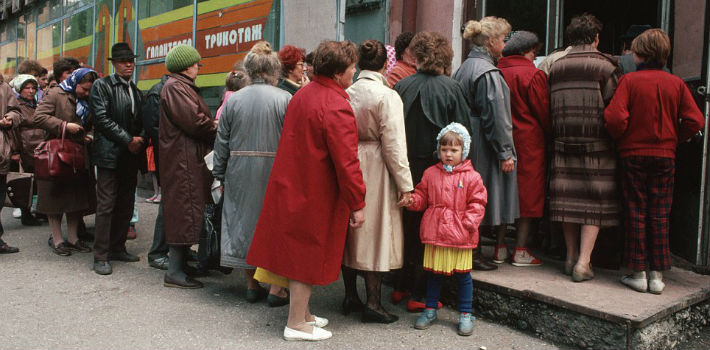
EspañolI’ve had the dubious fortune to experience life in two countries that claimed to be marching towards socialism. I was in Chile between 1971 and 1972 when President Salvador Allende led a government attempting to create a socialist state of freedom. I lived in Venezuela from 1974 until President Hugo Chávez set course towards the “sea of happiness” that was nothing other than the Cuban socialist model.
In both cases I had to put up with lines outside stores provoked by shortages, government-backed violence, and a harsh daily existence in which every instant was dedicated to hunting down basic products and food.
Venezuelan socialism was, for a while, able to hide the miseries that came in its wake. The elevated price of oil on global markets gave the government foreign currency reserves to plow money into social spending programs that consisted of little more than cash handouts. The government wrote blank checks to finance the spread of its ideology abroad, and to swell a burgeoning bureaucracy dependent on state largesse for its existence.
But prices fell, as they always do, and now we can appreciate the real consequences of the nefarious policies that have governed the country for the past 15 years.
The dictatorial regime in Venezuela even persecutes its citizens for taking photos of lines and empty shelves.
Today, those few private enterprises left in Venezuela have no access to US dollars to buy the resources they need to manufacture basic goods. Rampant shortages of food, medicines, and other goods force citizens to spend hours in shockingly long lines outside stores.
State services are poor quality, with the three million government employees in a country of 30 million people serving no other purpose than to leech off society, which grows poorer day by day.
A few days ago, Jorge Giordani, who was hailed for years as the “czar” of the Venezuelan economy, said that the country had lost its wealth, and that the “bureaucracy, ignorance, and incompetence” of the regime had brought it to the brink of catastrophe.
However, Giordani took care to add that these evils belonged to “the capitalist system” itself. I wasn’t surprised: I knew Giordani when we both lectured at Venezuela’s Central University. He was a sorry sight: a firm defender of the regime in North Korea, he repeated insipid doctrines to deceive his students instead of educating them.
Giordani, along with his friends and comrades, is responsible for leading Venezuela down the socialist path to chaos. Now every variety of private enterprise is under attack, the state maintains a tight grip over foreign trade, and an immense bureaucracy manages government funds with incompetence and corruption.
The former minister neglected to note that the dictatorial regime in Venezuela even persecutes its citizens for taking photos of lines and empty shelves. There no longer exists any division of powers in Venezuela as is necessary for a healthy democracy.
When the state is given immense power over the economy and lives of individuals, nothing other than widespread poverty and oppression are the result.
It’s no accident that this institutional and material impoverishment has taken place in Venezuela. The same happened in Chile during the 1970s, although the current government of the Andean country is trying to paper over the economic failures of its ideological predecessors.
Cubans have had to put up with an even worse system for decades, subject to the tyranny of Fidel Castro, who’s ruled the island like an absolute monarch for over half a century. An identical economic disaster took place in the Soviet Union, in China, and in other socialist countries: an all-powerful state produced sophisticated weapons and satellites while citizens were confronted with repression and misery, and have to fight to secure clothing and food. Basic electronics, to say nothing of modern technology, were all a luxury reserved for the elite few.
To these deprivations were added shocking restrictions on personal liberty: in the Soviet Union, the government even banned typewriters for personal use.
The conclusions are obvious, but some stubbornly refuse to arrive at them. When the network of voluntary exchange of goods and services — in other words, the market — is broken, when individual freedoms are denied, when the state is given immense power over the economy and lives of individuals, nothing other than widespread poverty and oppression are the result.
Socialism is misery, and worst of all is that those who live under it can rarely escape for fear of government repression or lack of economic opportunities, and have little chance to change their way of life. I hope that Venezuela may yet prove the exception to the rule, but sadly that is unlikely to be the case.
Translated by Laurie Blair. Edited by Guillermo Jimenez.
 Versión Español
Versión Español












